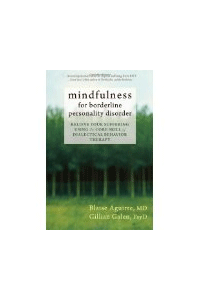“Mindfulness for Borderline Personality Disorder: Relieve Your Suffering Using the Core Skill of Dialectical Behavior Therapy”

“Mindfulness for Borderline Personality Disorder: Relieve Your Suffering Using the Core Skill of Dialectical Behavior Therapy”
By Blaise Aguirre and Gillian Galen
New Harbinger Publications
Oakland, Calif., 2013
Volume helps readers understand mindfulness
Reviewed by Paul Efthim, Ph.D.
McLean Hospital in Belmont, Mass. is famous for its celebrity guest list: Sylvia Plath, Anne Sexton, James Taylor, Ray Charles and David Foster Wallace passed through its hallowed wards. But McLean also should be recognized for its pioneering approaches to treat borderline personality disorder stretching back to the mid-20th century. Initially employing psychoanalytic approaches, McLean staff introduced cognitive-behavioral models during the 1990s, most notably dialectical behavior therapy developed by Marsha Linehan.
Since that time, DBT has established itself as a well-regarded treatment for BPD. Psychotherapists and patients alike are drawn to its no-nonsense, skills-based methodology. Although DBT lends itself to didactic and manualized approaches, it is not easily mastered and is frequently used in a superficial manner by novice and even experienced therapists.
Two McLean DBT experts, psychiatrist Blaise Aguirre and psychologist Gillian Galen, recently published a self-help book that deepens one’s ability to use DBT effectively.
“Mindfulness for Borderline Personality Disorder” focuses on the central DBT skill of mindfulness, which involves being in the present moment and recognizing internal experience without acting on it. More than most other books on the subject, this volume helps readers understand mindfulness and how it facilitates the development of all domains of DBT skills.
The first 100 pages of this accessible book are devoted to defining BPD and describing the practice of mindfulness in considerable detail. Surprisingly, there is no reference to how early life experiences of trauma, neglect and invalidating environments can contribute to the formation of BPD.
Rather than looking into the past – and consistent with a mindful focus on the present moment – the authors take a symptom-focused approach to describing BPD and showing how mindfulness can reduce suffering and increase one’s capacity for pleasure and joy. Clear instructions lay out exercises for practicing mindfulness in accessible non-threatening ways (e.g., watch TV without simultaneously checking your computer or phone; drive without the radio or using your cell phone).
The next section of the book teaches how to apply mindfulness skills to BPD symptoms relating to emotional, interpersonal, behavioral, cognitive and self-regulation. Aguirre and Galen summarize DBT skills in each domain and illuminate how a regular mindfulness practice can enhance one’s ability to apply skills. They go beyond Linehan’s skills manual to add their own suggestions for applying mindfulness to dissociative symptoms, identity disturbance and emptiness, among other problem areas.
The book’s tone is gentle and inspirational and the text is peppered with first-person narratives from patients struggling to recover from BPD. A final chapter guides readers to examine the stories they tell themselves and how to apply mindfulness to telling one’s story. One minor quibble: the book would have benefited from an index to key terms for easy reference.
This fine book will be of interest to anyone diagnosed with BPD and to therapists of all experience levels using DBT and mindfulness in their practice.
Paul Efthim, Ph.D. is a licensed psychologist in private practice in Brookline, Mass. He holds a faculty appointment at the Boston Institute for Psychotherapy and is a candidate at the Massachusetts Institute for Psychoanalysis.
Learn more about the book: Mindfulness for Borderline Personality Disorder: Relieve Your Suffering Using the Core Skill of Dialectical Behavior Therapy
